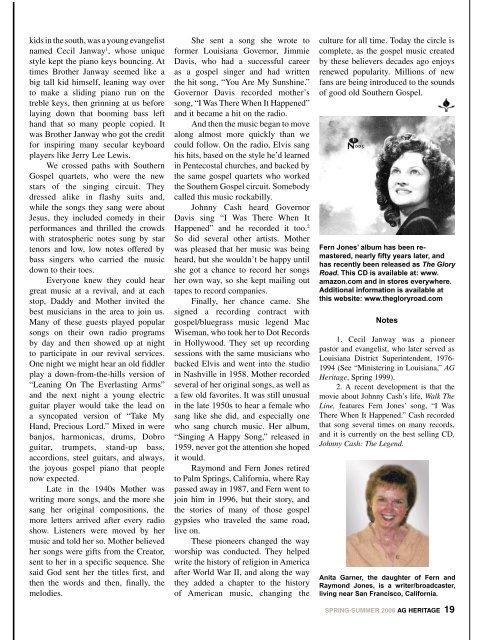2006_01
2006_01
2006_01
Create successful ePaper yourself
Turn your PDF publications into a flip-book with our unique Google optimized e-Paper software.
kids in the south, was a young evangelist<br />
named Cecil Janway 1 , whose unique<br />
style kept the piano keys bouncing. At<br />
times Brother Janway seemed like a<br />
big tall kid himself, leaning way over<br />
to make a sliding piano run on the<br />
treble keys, then grinning at us before<br />
laying down that booming bass left<br />
hand that so many people copied. It<br />
was Brother Janway who got the credit<br />
for inspiring many secular keyboard<br />
players like Jerry Lee Lewis.<br />
We crossed paths with Southern<br />
Gospel quartets, who were the new<br />
stars of the singing circuit. They<br />
dressed alike in flashy suits and,<br />
while the songs they sang were about<br />
Jesus, they included comedy in their<br />
performances and thrilled the crowds<br />
with stratospheric notes sung by star<br />
tenors and low, low notes offered by<br />
bass singers who carried the music<br />
down to their toes.<br />
Everyone knew they could hear<br />
great music at a revival, and at each<br />
stop, Daddy and Mother invited the<br />
best musicians in the area to join us.<br />
Many of these guests played popular<br />
songs on their own radio programs<br />
by day and then showed up at night<br />
to participate in our revival services.<br />
One night we might hear an old fiddler<br />
play a down-from-the-hills version of<br />
“Leaning On The Everlasting Arms”<br />
and the next night a young electric<br />
guitar player would take the lead on<br />
a syncopated version of “Take My<br />
Hand, Precious Lord.” Mixed in were<br />
banjos, harmonicas, drums, Dobro<br />
guitar, trumpets, stand-up bass,<br />
accordions, steel guitars, and always,<br />
the joyous gospel piano that people<br />
now expected.<br />
Late in the 1940s Mother was<br />
writing more songs, and the more she<br />
sang her original compositions, the<br />
more letters arrived after every radio<br />
show. Listeners were moved by her<br />
music and told her so. Mother believed<br />
her songs were gifts from the Creator,<br />
sent to her in a specific sequence. She<br />
said God sent her the titles first, and<br />
then the words and then, finally, the<br />
melodies.<br />
She sent a song she wrote to<br />
former Louisiana Governor, Jimmie<br />
Davis, who had a successful career<br />
as a gospel singer and had written<br />
the hit song, “You Are My Sunshine.”<br />
Governor Davis recorded mother’s<br />
song, “I Was There When It Happened”<br />
and it became a hit on the radio.<br />
And then the music began to move<br />
along almost more quickly than we<br />
could follow. On the radio, Elvis sang<br />
his hits, based on the style he’d learned<br />
in Pentecostal churches, and backed by<br />
the same gospel quartets who worked<br />
the Southern Gospel circuit. Somebody<br />
called this music rockabilly.<br />
Johnny Cash heard Governor<br />
Davis sing “I Was There When It<br />
Happened” and he recorded it too. 2<br />
So did several other artists. Mother<br />
was pleased that her music was being<br />
heard, but she wouldn’t be happy until<br />
she got a chance to record her songs<br />
her own way, so she kept mailing out<br />
tapes to record companies.<br />
Finally, her chance came. She<br />
signed a recording contract with<br />
gospel/bluegrass music legend Mac<br />
Wiseman, who took her to Dot Records<br />
in Hollywood. They set up recording<br />
sessions with the same musicians who<br />
backed Elvis and went into the studio<br />
in Nashville in 1958. Mother recorded<br />
several of her original songs, as well as<br />
a few old favorites. It was still unusual<br />
in the late 1950s to hear a female who<br />
sang like she did, and especially one<br />
who sang church music. Her album,<br />
“Singing A Happy Song,” released in<br />
1959, never got the attention she hoped<br />
it would.<br />
Raymond and Fern Jones retired<br />
to Palm Springs, California, where Ray<br />
passed away in 1987, and Fern went to<br />
join him in 1996, but their story, and<br />
the stories of many of those gospel<br />
gypsies who traveled the same road,<br />
live on.<br />
These pioneers changed the way<br />
worship was conducted. They helped<br />
write the history of religion in America<br />
after World War II, and along the way<br />
they added a chapter to the history<br />
of American music, changing the<br />
culture for all time. Today the circle is<br />
complete, as the gospel music created<br />
by these believers decades ago enjoys<br />
renewed popularity. Millions of new<br />
fans are being introduced to the sounds<br />
of good old Southern Gospel.<br />
Fern Jones’ album has been remastered,<br />
nearly fifty years later, and<br />
has recently been released as The Glory<br />
Road. This CD is available at: www.<br />
amazon.com and in stores everywhere.<br />
Additional information is available at<br />
this website: www.thegloryroad.com<br />
Notes<br />
1. Cecil Janway was a pioneer<br />
pastor and evangelist, who later served as<br />
Louisiana District Superintendent, 1976-<br />
1994 (See “Ministering in Louisiana,” AG<br />
Heritage, Spring 1999).<br />
2. A recent development is that the<br />
movie about Johnny Cash’s life, Walk The<br />
Line, features Fern Jones’ song, “I Was<br />
There When It Happened.” Cash recorded<br />
that song several times on many records,<br />
and it is currently on the best selling CD,<br />
Johnny Cash: The Legend.<br />
Anita Garner, the daughter of Fern and<br />
Raymond Jones, is a writer/broadcaster,<br />
living near San Francisco, California.<br />
SPRING-SUMMER <strong>2006</strong> AG HERITAGE 19


